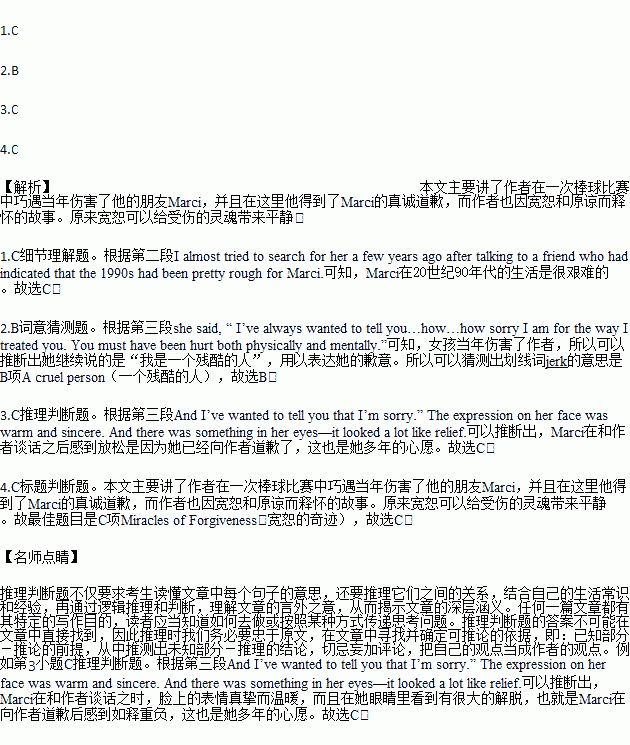题目内容
"Joe? Is that you?" The woman speaking to me at the baseball game looked a little familiar. "Marci?" I asked.
"It IS you!" she cried out, smiling broadly. "Gosh, it's good to see you again!"
It was good to see Marci, too. Off and on during the past few decades, I've wondered about her. I almost tried to search for her a few years ago after talking to a friend who had indicated that the 1990s had been pretty rough for Marci. So meeting her at the baseball game was really out of expectation.
We spent a few minutes talking about our lives—the good old, bad old days. Then Marci grew quiet for a moment. “You know, Joe,” she said, “ I’ve always wanted to tell you…how…how sorry I am for the way I treated you. You must have been hurt both physically and mentally.” I was a little embarrassed. I turned and looked at her. “It’s OK,” I said, “No big deal!” “But I was such a jerk.” she continued. Yes you were, I thought. “We were both pretty young,” I smiled. “I know.” she said, “It’s just always bothered me, remembering how mean I was to you. And I’ve wanted to tell you that I’m sorry.”
The expression on her face was warm and sincere. And there was something in her eyes—it looked a lot like relief. “OK,” I said. "Apology accepted!” Overcome by the sweetness of the moment, I reached an arm around her and gave her a quick hug. Just then, the crowd erupted with a huge cheer, and Marci and I both returned our attention to the game. By the time I looked over to where she had been, she was gone. But the warm, wonderful feeling of our brief exchange was still there, and continues to this day whenever I think about it .
It isn't enough to just say “I’m sorry” and "You're forgiven." But when those words are truly felt and sincerely expressed, they can open the door to miracles of the heart. Forgiveness can bring peace to an injured soul—even years after the fact. Even at a baseball game.
1.What kind of life did Marci live during the late 20th century according to the passage?
A. Happy. B. Busy. C. Hard. D. Simple.
2.What does the underlined word “jerk” in the third paragraph mean?
A. A humorous person.
B. A cruel person.
C. A careless person.
D. An honest person.
3.Why did Marci look in relief after talking with the author?
A. Because her favorite team won the game.
B. Because she learned Joe was living a good life.
C. Because she made an apology to the author.
D. Because she found she was not mean any longer.
4.What might be the best title for the passage?
A. Excitement of A Baseball Game
B. Mental Burden of A Woman
C. Miracles of Forgiveness
D. Relief of Finding A friend
 阅读快车系列答案
阅读快车系列答案
